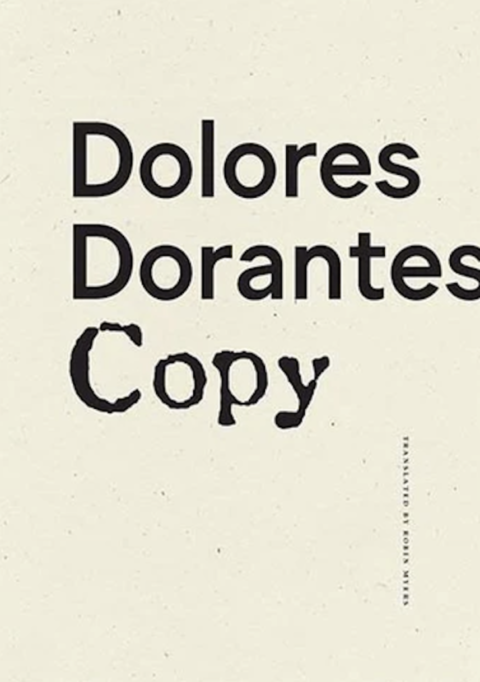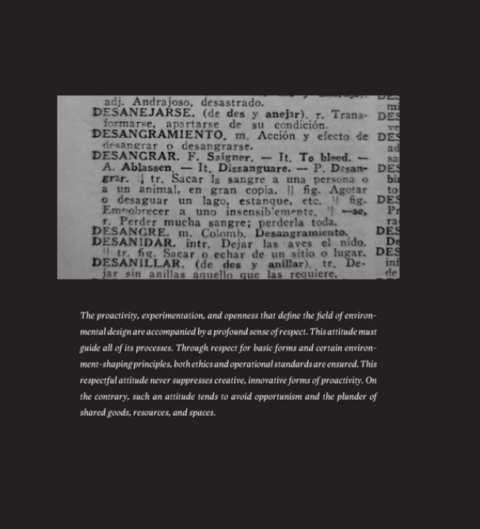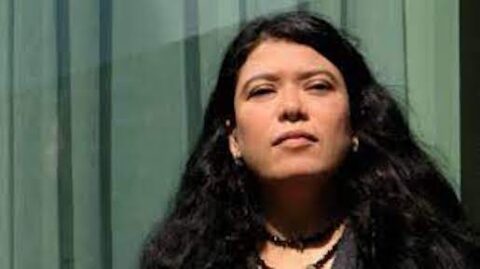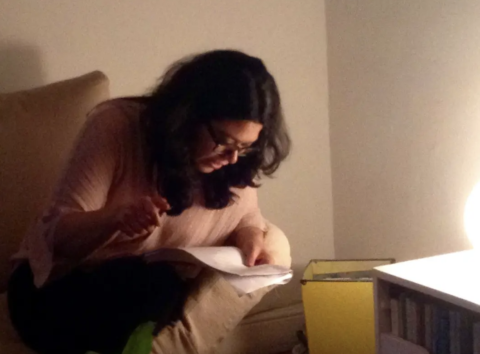 1
1
I can’t decide if the story of leaving a homeland is a narrative of rebirth or a story of origin. Dolores Dorantes was born in Mexico, in the mountainous regions of Veracruz. She lived most of her life in Ciudad Juárez, where she promoted writing among marginalized, vulnerable and incarcerated women. After receiving death threats, Dorantes fled Mexico in 2011 and was granted political asylum in Los Angeles. The vast majority of asylum claims at the US border with Mexico are denied.
2
I can’t decide if the story of leaving a homeland is an elegy for those left behind, or for the self that dies when crossing a border. Less than a year later, Dorantes published a eulogy for her peer, Guillermo Fernández García, a poet and translator who was found beaten to death in his Mexican apartment — his mouth sealed shut with tape, his hands tied together, his computers and valuables completely untouched.
The brevity of Dorantes’ eulogy scathes the air; the language hisses like the door of a freshly-opened crypt whose names have been erased by decades of terror and silence. Dismissing the “robbery theory” used by officials to explain the violent deaths of Mexican activists and artists, Dorantes describes how the media “converts the victims of the crimes of the State into criminals who deserved to die.” She ends the eulogy with a “postscript”:
“If one of these days I get ‘robbed,’ you already know who it was — and that it happened because I too, surely, was ‘into something.'”
3
Dorantes identifies as a Black-Indigenous Nahua on her maternal side and a Spaniard and mestiza on her paternal side. She is a journalist, a writer, a therapist, a poet, a performer, and a sacred animal who is Acharya in the Buddhist tradition. She is also, officially, a political refugee.
 [left: Robin Myers] The indefatigable Robin Myers, who currently lives in Mexico City, has translated over 12 books from Spanish to English. To Dorantes’ COPY, Myers adds her own finesse for language and attention to sharp syntax. It is difficult to imagine a more engaging, full-bodied translation.
[left: Robin Myers] The indefatigable Robin Myers, who currently lives in Mexico City, has translated over 12 books from Spanish to English. To Dorantes’ COPY, Myers adds her own finesse for language and attention to sharp syntax. It is difficult to imagine a more engaging, full-bodied translation.
4
I can’t decide where to begin in the dialogue Dorantes maintains with Palestinian poet Mahmoud Darwish, particularly the idea of the presence of absences.
Both prefatory epigraphs come from Darwish’s prose poem series, In the Presence of Absence (as translated by Sinan Antoon), a book written in his later years, a book which opens with an epigraph from Malik Ibn al-Rayb al-Tumini’s self-elegy. As a pre-modern Arab poet writing in the past millennia, al-Tumini inaugurated an elegiac form that influenced Darwish, and one could argue that In the Presence of Absence borrows the self-elegy’s preemptive lament.
So — Darwish wrote a book inspired by an ancient self-elegy, and Dorantes uses quotations from this book as an epigraph to Copy. Both poets ask similar questions. Who am I? What does it mean to exist outside the homeland? What does it mean to speak and to exist across the borders of language and memory?
“This is I,” Darwish tells us in the epigraph, “This is he”:
“This is the miserable one, son of the miserable man and miserable woman. Son of your water and fire. I came from your, from nothingness, from one of your old poms, I came. I came from the imagination to return it to you and to carve your name, in stone like all the other poets of this wasteland.”
A “nocturnal echo” responds by re-asking the same question (this echoing strategy surfaces in Dorantes’ book) but Darwish cannot answer it. Or, he answers it by leading us back to the beginning, pointing to a story of origins: “This is I. This is he,” he repeats. “This is all of my imagination.”
The second epigraph is simpler: “But expressing emotions, they say, is not one of the attributes of exile.” Dorante’s Copy picks up Darwish’s questions, and devotes itself to the singular voice — but she adds several layers of complexity, including unattributed quotations, untranslated xeroxes, and a complete absence of proper nouns. These structural decisions complicate my ability to tag them, or reference them – a move I value as both intentional and brilliant.
5
Unlike Darwish, Dorantes gives us no table of contents to provide order, or enable the reader to expect what is to come. The reader moves through the untitled chapters, using the chapter epigraphs and dictionary pages to frame the poems which follow.
Where Darwish gives us proper nouns (i.e. naming friends like Emile Habibi, chronicling his return to Palestine where he pays tribute to his father’s grave and various towns), Dorantes provides no such geography, no lexicon of place-names and persons. We don’t know who is being assaulted or murdered. We don’t know the names of the checkpoints or deserts. There is no specificity. We have only repetition and quotation to guide us through the apparatus of borders and refugee-processing language.
6
In his Arcades Project, Walter Benjamin created a book, a sort of flaneury composed of quotations, a geography of intersections where the speaker’s words blur with the quoted, or the copy. I thought of Benjamin when wandering through Dorantes’ absence of quote-unquote, notably, the absence of any punctuation apart from periods and semicolons.
7
“Without the copying process,” the poet Dolores Dorantes has said, “there would be no life, no reality.”
Copy is a serial work: each chapter begins with a black page that includes a photocopy of a page excerpted from a 20th century Spanish dictionary and, below this image, a quotation from Ariel Vercelli’s text about collaborative production (as translated by Robin Myers).
The photocopied dictionary entries remain untranslated – in this sense, they are pure quotations. Vercelli’s epigraphs, on the other hand, exist in a sort of suspended dialogue with the dictionary entries which are collaborative by nature.
Dorantes doesn’t reference that she is quoting Vercelli’s source text on the chapter pages; this information is given in small print at the end of the book, thickening the interrogations of creation and authorship which run throughout these poems.
The first chapter page:

8
Because this book rejects linear chronology, I focused more on what Dorantes was doing with language rather than on what the language meant. The meaning keeps changing. But the book is based on these copies from a Spanish dictionary — and I don’t speak or read Spanish. I don’t know if I’m in a position to properly read or understand this book.
9
And yet — I couldn’t keep my hands from returning to it, circling words, underlining metaphors, getting wasted by the magic of the syntax. This obsession led me further into my own ignorance. When I translated each photocopied image from Spanish into English, a different book appeared, a book that relies on collage from the copies.
Desangramiento translates into “exsanguination.” Also: “An action which has the effect of removing blood.” Or desangra, “to bleed.” Also: “drawing the blood from a person or animal in large copy.” The dictionary examples, designated by “fig.” include: “Exhaust or deplete a side, a pond, etc.” “To impoverish one callously.” “To lose a lot of blood, to lose all of it.” Or desanidar, “unnesting.”
Translating the copies enabled me to see the series of poems mimicking and echoing the untranslated definitions.
10
Now that I’ve touched on the structure, I need to describe the unique motion of this book. Relying on sound rather than grammar to create connections between subjects and verbs, Dorantes’ brisk syntax builds rhythm and sonority from repetition. Punctuation determines pacing; the first page, alone, is dotted by 59 periods:
“Life’s purpose is the fulfillment of duty, under social pressure. The line of personal responsibility grows fainter and fainter. To escape. To escape responsibility. To escape responsibility through the fulfillment of duty: to submit. You are you, fainter and fainter. To escape compassion copiously.”
The lines move by building definitions, stacking words and phrases until something emerges, and this rebuilding mimics the grammar of fleeing a country, or living in exile, bound to requalify one’s narrated self. This particular accretive mode reminded me of Darwish’s repetition strategy, which builds towards surprise through agglutination.
“In this fog where the blood shows through. To lose it. To lose all of it. In fulfillment of duty, because we think it’s the same. Blood.”
Dorantes’ periods don’t offer closure. Instead, the tiny black dot discloses the multiple meanings inside each thought, opening a hole in the logic of language.
11
Some poems begin with a short bolded phrase which could be taken for a title, and I will excerpt this poem to foreground the grammar, syntax, and repetitions:
“To do is to undo. Copiously. You live because someone cast enough light onto the edge of the highway. The decomposition of light. You live because you removed yourself from your condition while your family prayed, trapped in the fire, undoing darkness and substance. To do is to undo. You live because the soldiers set their march and their checkpoints above the nest. The soldiers plotted a safe shelter with your blood. To lose one’s blood, to lose all of it. To lose one’s identity. You live, like an animal or like a room ousted from its place. To lose one’s place. To lose one’s mind. To lose one’s address. Because it’s precisely this bird leaving the nest, draining the pond, to be callously impoverished, to be transformed, that you embraced as you embraced life.”
The italicized words often refer directly back to the photocopied, untranslated page.
Is Dorantes engaging in an act of creative translation which challenges citation and sourcing, and reveals how each dictionary meaning signifies something different in context?
12
Going back to Darwish, to enter what Dorantes calls “the present of identity” involves riffing off a dated dictionary, borrowing the attempt to define, revealing the presence of absence in language itself. There are several forms of repetition happening here. The poet bolts the first line or phrase of each poem and then repeats that line in the body, expanding upon it, putting pressure on the language itself, as in: “A commonplace: to feel. An order. The decomposition of blood.” To reassemble oneself “, seven. Perhaps she is giving us alternate forms of titling.
As with Darwish’s book, the use of continuous second-person locates tension in the self, as a slate overwritten by others. The “You” is both the speaker and the interlocutor, and there is an elegiac tone to this. “You clung to predation,” Dorantes writes, indicting the speaker alongside the interlocutor. For “you’re the one drowning in your own shadow.” The interrogations offer questioning words without a question mark to punctuate them; each question invokes the weight of facticity.
Again, the echoes of Darwish in the blurred self: “You, not I, live in terror of the weapons and positions” or “All of you, not me.”
13
One chapter page’s copy includes a diagram of light passing through a pyramid, captioned in Spanish, meaning: “The decomposition of light.” The unascribed epigraph notes that “value and wealth are produced at the margins.” Again, I translated the words in the definition. Descomponible. Decomposable. Susceptible to decomposition. Descomposición. Decomposition, Confusion. An action that causes decomposing. Descompostura. To break down. Impudence, lack of respect.
The poem begins with the warning: “You’re vanishing.” Suddenly, Dorantes shifts to a plural pronoun as speaker:
“We’ve all had the same experience. We think responsibility and fulfillment of duty are one single thing. Corporate identity. To mold oneself. To consent.”
 The corporate body is convincing — it identifies with every I by rendering it indistinct. By using the corporate “We,” Dorantes plays with the incoherence of consent in circumstances of erasure, standardization, and group pressure. She applies this to the nation-state’s body (“Obeying the dominant political ideology. To mold oneself.”) as well as the business corporation (“We align ourselves through the body. Through our color. Through uniformed attire.”), and she blurs these two corpuses until they resemble the a unified march:
The corporate body is convincing — it identifies with every I by rendering it indistinct. By using the corporate “We,” Dorantes plays with the incoherence of consent in circumstances of erasure, standardization, and group pressure. She applies this to the nation-state’s body (“Obeying the dominant political ideology. To mold oneself.”) as well as the business corporation (“We align ourselves through the body. Through our color. Through uniformed attire.”), and she blurs these two corpuses until they resemble the a unified march:
“To follow, devoutly, the rules of worldly success. Business. Devoutly. Loyalty is identity.”
Chanting words from the previous chapter (“To deny everything. Callously.”), dragging them into this new context, rejects a neat division between the past and present in Dorante’s poems. She bolds the quoted the chapter epigraph and attaches her translation of the copy to it:
“It’s produced in the margins. You are you and your disappointment. The decomposition of the light. Copiously.”
And she repeats the untranslated photopied image: “Observing decomposition isn’t an attribute of your circumstances.”
14
The margins also offer a mask formed by language, as in “producing your mask.” The lyrical beauty overcomes the last poem in this series, which also instructs, but turns slightly towards Darwish in its imagining:
“Observing the light the tower casts on you isn’t an attribute of your circumstances. Say you’re the course. The inaccessible nature that pushed stones toward this mountain. Say you’re a stone. Let’s finish the interrogation.”
One dictionary copy defines communal as enormous, monstrous, extraordinary. Dorantes’ poems play with this word, poking it, shaping it, revealing how the communal becomes a policed space, a border, as in “you are your enemy.”
She traces the linguistic apparatus, the interrogation, which produces the plural pronoun — the We, the They, the Them. To be part of a we-body is to be a body, or to be incorporated. Is this another way of belonging?
“You’re alive because, as they were killing him, you believed you were overhearing a sexual act,” the speaker says, shifting between a male interlocutor who believes “in the worship of army boots” and the self, which is to say: the one being defined by the pronouns.
15
No word occurs with more frequency than “you” — I counted somewhere close to 382 uses of “you” in COPY.
“You, not I, are produced in the margins,” Dorantes writes.
16
In 1984, Mahmoud Darwish underwent heart surgery in Vienna. When his heart stopped for two minutes, he saw himself “swimming on white clouds” and remembered his “entire childhood.”
17
To be granted asylum in the US, refugees must submit to a “credible fear” interview conducted by the Department of Homeland Security. Since this process is governed by administrative norms and policy-based metrics, the refugee is expected to narrate themselves according to the government’s game-plan. But a refugee is a person who lives in dialogue with threat, and often struggles with language, fear, the risk of deportation, the consequence of naming names. I thought about the survivor’s guilt of asylum that follows those who survive the administrative system as I was reading Dolores Dorantes’ Copy.
I can’t decide if the story of leaving a homeland is a narrative of rebirth or a story of origin.
18
Countering the claim with qualifications, a strategy including the bolded first phrase (“The extreme space is what produces creativity.”) followed by refusal of agency (“She, not you, sprawled face down on the pavement”). Dorantes quotes the definition again in bolded font: “uncommonly large, enormous,” but the referent changes immediately:
“The decomposition of blood. The decomposition of light. You’re vanishing.”
Fear speaks through the sensory details of a body losing consciousness, a self face-down who cannot see but only hears voices and boots. “I’m the inventor of fear,” Dorantes writes. [“I used to invent love when necessary,” Darwish echoes.]
“Repeat. That fear (bolded) betrayed you. Repeat.”
 Dorantes slips female gender into the interrogative mode, suggesting that you is derived, or derivative, connoting perhaps the rub of Adam’s rib: “Scornfully. To be, in the feminine. With scorn for yourself. Not to be.”
Dorantes slips female gender into the interrogative mode, suggesting that you is derived, or derivative, connoting perhaps the rub of Adam’s rib: “Scornfully. To be, in the feminine. With scorn for yourself. Not to be.”
The self is molded by duty and by structure, by the apparatus of language and expectation, by the repetitions “As often as ordered by the structure.”
“You and not you are a prior being. Prior: the place from which understanding is pursued.”
The “tragic destiny” invoked in the chapter epigraph returns in the poems,where it is located “at the edge of the highway.” And then another “tragic destiny in front of the watchtower.” Now it is you who is lying “face down”:
“And I, it comes with me. Uncorked, uprooted from itself. This you is me. Climbing the tower with its hook-mouth. Gagged. To be able to think: this you is me. This you transported from a tragic destiny. Displacement. Say you’re a stone.”
The repetitions continue because “this is your gun powder,” this is “your fascination with reality.” And the next chapter picks up the word displacement with the image of “desplazamiento,” or an action which displaces.
Dorantes rubs language to approach the container vessel, or the line between outside and inside, the border of placehood, beginning with “You are him and you are you. Reversible. Prior. Unable to understand.” And the word displeasure is to dislocate by volume of water. The poet continues, and works this definition again into the poem, “volume of water reflecting space.”
Dorantes cross-hatches the future into the past:
“The animals. The circumstance. The stone thrown into the street. The darkness. Copiously. A copy of everything invisible. A copy of everything displaced. One constructs time. The abundant place. Singular.”
Darwish’s deserts echo in Dorantes’ American borderlands and border walls, where displacement means: “To occupy a place in the hot silence of sand.”
Ending the chapter in direct address, Dorantes repeats phrases until they become echoes solid enough to trap light and serve as mirrors: “Let’s finish the interrogation. This isn’t an army.”
19
The epigraph from a later chapter defines “collaborative production” as a dialogue with what has been produced in the past. The poems which follow bring in the interrogator language of customs officials as well as corporate culture. Replicating the injunction to classify behavior, perception, the signified, the reader is given a series of commands followed by fill-in-the-blanks.
Dorantes’ “answer” seems to lean towards leaving the blanks open, refusing the commands, rejecting the boxes and classifying systems entirely.
I write this, even as I realize the flimsiness of my I, the flaccidity of its belief that I can exist, or that It can exist without consequence, without rendering Me part of the system. Susan Briante has written about this, and there is a sense in which Briante’s Defacing the Monument came to mind as a different docu-poetic approach. Where Briante’s includes multiple interactive, paratextual blanks, quizzes, questions which readers are encouraged to think through, COPY doesn’t double as a workbook.
Where Briante’s theory instructs by demarcating the ownership of particular places and appropriations, Dorantes’ theory enacts radical creativity as part of a vision to open and expand space. Although I don’t read these two writers in opposition, I was intrigued by the difference in docu-poetic texture.
20
I also discerned a pulse in Dorantes’ Copy reminiscent of Svetlana Boym’s theory of the off-modern, calling for an artistic practice which engages and builds from the relics and ruins of dated materials and monuments. Against a settled patrimony, Dorantes poses experimentation and jamming.
And so Dorantes’ final chapter begins with a photocopy of a lengthy definition for “Copia,” where bolded type gives us the words meaning in English as “copiousness, abundance, copy, transcript” — I can’t decide if the story of leaving a homeland is a narrative of rebirth or a story of origin.
/ / /
Dolores Dorante in Los Angeles, 2015, after being granted political asylum.
